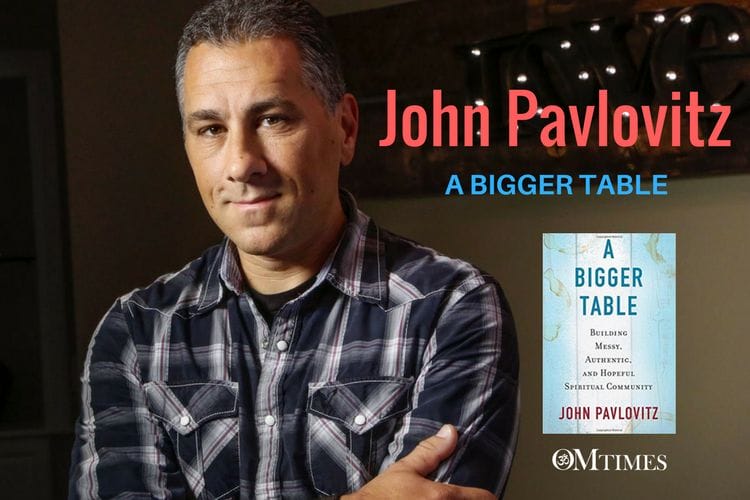John Pavlovitz: A Bigger Table

John Pavlovitz is a writer, pastor, and activist. A 20-year veteran in the trenches of local church ministry, John is committed to equality, diversity, and justice—both inside and outside of faith communities. In 2017 he released his first book, A Bigger Table.
John Pavlovitz: A Bigger Table – Building Messy, Authentic and Hopeful Spiritual Community
Interview by Sylvia Henderson John Pavlovitz is a pastor, a writer and an activist from Wake Forest, North Carolina. In the past four years, his blog, Stuff That Needs to be Said, has reached a diverse, worldwide audience. His name is John Pavlovitz, and he is a 20-year veteran in the trenches of local church ministry. John is committed to equality, diversity, and justice, both inside and outside of faith-based communities.
John Pavlovitz is a pastor, a writer and an activist from Wake Forest, North Carolina. In the past four years, his blog, Stuff That Needs to be Said, has reached a diverse, worldwide audience. His name is John Pavlovitz, and he is a 20-year veteran in the trenches of local church ministry. John is committed to equality, diversity, and justice, both inside and outside of faith-based communities.
In his book A Bigger Table: Building Messy, Authentic and Hopeful Spiritual Community, John Pavlovitz says courage and kindness are evident as he fearlessly speaks directly into the heart of heated issues that Christian communities have publicly and privately wrestled with for decades regarding LGBTQ inclusion, gender equality, racial tensions and global concerns.
John Pavlovitz’s is a voice that is unique. A voice that cries out to the Christian community to put an end to exclusion, bigotry, divisiveness, and fear. A voice that longs to see churches emulate unconditional love and demonstrate wholehearted acceptance of everyone with compassion and radical hospitality, total authenticity, messy diversity and create agenda-free spiritual communities that leaves no one left out.
Interview with John Pavlovitz
To listen to the full interview of John Pavlovitz by Sylvia Henderson on Intuitive Transformations on OMTimes Radio, click the player below.
John Pavlovitz: Thank you so much. It’s a thrill to get the invitation.
Sylvia Henderson: For those who are not familiar with you and aren’t sure what your mission is and, can you tell us about yourself and your spiritual journey?
John Pavlovitz: I grew up in Upstate New York. I was raised Catholic, and so a Roman Catholic Italian family. So, I tell people I was raised on gluten and guilt, and I grew up in Upstate New York. And slowly, as I got a little older, approached college years, I kind of drifted from that faith. I wasn’t really connecting it to kind of everyday life and wasn’t see it, the church being what I thought the church was supposed to be.
And really, through the process of moving to Philadelphia and being exposed to a great deal of diversity, being exposed to poverty, my heart began to change, and I started to really embrace sort of that bigger table idea of living. And 10 years later, I was sort of pulled back into organized religion, started volunteering for a church and found myself after that becoming a pastor, which was a completely unexpected path for me. I was sort of drafted into ministry, and so began, started down the road about 20 years ago of serving in the local church, but in doing that, started to see along with so many beautiful and life-giving things, I began to see things that grieved me about the church and about organized religion. And so, there was that tension that I’ve lived in for that time of being a part of this thing but then lamenting so much of it. And the writing has really been an expression of that, trying to figure out how to wrestle with that sort of tension.
Sylvia Henderson: And so, you said that some things really grieved you about what you were seeing in the local churches. And so, what were you seeing that was impacting you to such a degree that it prompted you to begin writing your blog Stuff That Needs To Be Said?
John Pavlovitz: I think what I started to see over the course of a few years was that I could look back and realize that the church had shrunken my table. So, I was only around, Christians, and I was only around Christians in my church specifically and those in my church who agreed with me. And so, I think what the church tends to do is sort of sequester people, and it becomes a very parochial sort of experience.
But, I also had sort of wrestling with the theology of the church that was anti-gay or anti-transgender or looking at why women weren’t welcomed fully into ministry leadership and the hostility in much of the Christian church toward the Muslim faith. So, all those things I began to kind of try to figure out is there a better way to be a Christian in the world, and can you still have the tradition and live in a wider, more expansive way. And so, the blog started as an insider sort of writing to my community. We had a large church in Charlotte, and I was writing to parents of teenagers as a youth pastor and maybe to other ministers, but it slowly began to reach a wider audience. It just slowly organically happened.
The past four years have been really a more concerted effort to make that my life’s work and the ministry evolving more and more around a virtual capacity. But, I’ve just been really, fortunate to have some of the pieces resonate with a larger part of the population.
Sylvia Henderson: Why has traditional Christianity struggled so much with modeling and extending unconditional love and acceptance? On the one hand, what has been traditionally taught from the pulpit is that God is an unconditionally loving God. Yet on the other hand What’s also being taught from the very same pulpits is that God’s love is discriminating and that you have to be, look, or need to behave a certain way to receive that unconditional love. Why is it so challenging for churches also to see the contradiction of that message?
John Pavlovitz: I think once you’re in an environment for a certain amount of time, you sort of lose perspective on that. You can’t really see it any longer. And so many people, grew up in exclusionary religion, a real fear-based theology or an image of God as very judgmental and angry. And so, those things are hard to unlearn and hard to step away from.
And, a lot of the work that I do is holding up a mirror to people and saying does this look like whatever God you’re trying to aspire to. For me, I’m also conscious of the fact that, if I’m talking to a group of people who claim the Christian faith, they all have a very different Jesus in their head. They have a very personalized, individualized Jesus.
So, it’s really that sort of using the Bible as a weapon or to reinforce your idea of God. And I think that’s where the church really struggles because it’s not really willing to embrace the breadth of what people’s Christian faith might look like. And so, it sticks into a very rigid orthodoxy often.
Sylvia Henderson: On your Book, you talk about some of the battle lines that the modern church has drawn in the sand that create that sustains the divisiveness. What are some of the all or nothing, issues or lines in the sand that the church has drawn that has locked other people out, because truly, by diminishing God’s capacity to love, they’re also diminishing God in some ways?
John Pavlovitz: I think, traditionally, the church historically has had difficulty with sex and sexuality. So, whether that is gender identity or sexual orientation or just, physical, sexual activity and sexual relationships and showing affection, I think so many of those become dividing lines. They become sort of places that we barricade ourselves by our theology. And so, I think there’s just so much damage that’s been done in the name of God in those areas. And I think, again, it comes down to the way that you want to wield the Bible because you can use those words to say a lot of things. And I think a lot of it is trying to find the heart of the people who wrote those words, who documented their experience of God at that place and time and understanding what they did and didn’t understand about the human body and about biology and, the world.
I think the less you’re able to really openly talk about something, the more shame that’s associated with it. The more guilt that you have around that issue, the more dangerous it becomes because it becomes fraught with just a scariness that the church has developed around sex and sexuality and gender issues and, gender roles for that matter.
I’m hoping to do with the work that I do is just deweird things that shouldn’t be weird, just to really talk openly about really the most natural and beautiful parts of who we are and that really deeply express our humanity. And I think that’s something that the church has really struggled with doing, with really attaching the humanity and the beauty to all those things.
Sylvia Henderson: So, what are some of the other things that are big hotbed issues that traditional churches have pushed aside and not really accepted fully?
John Pavlovitz: Well, what I talk about in the book is growing up with so many false stories, and I think religion, especially, the orthodox Christian religion tends to create these false stories about people of other faiths. Particularly right now, I think, the Muslim faith, for example, there’s a vilifying of other beliefs and even of non-believers. There’s a sense of we need to protect ourselves, we need to stay in the sort of bubble, and that’s a really dangerous place to live when everything around you become a potential threat or becomes or somehow less valid, right?
Continue to Page 2 of the interview with John Pavlovitz
OMTimes Magazine is one of the leading on-line content providers of positivity, wellness and personal empowerment. OMTimes Magazine - Co-Creating a More Conscious Reality



